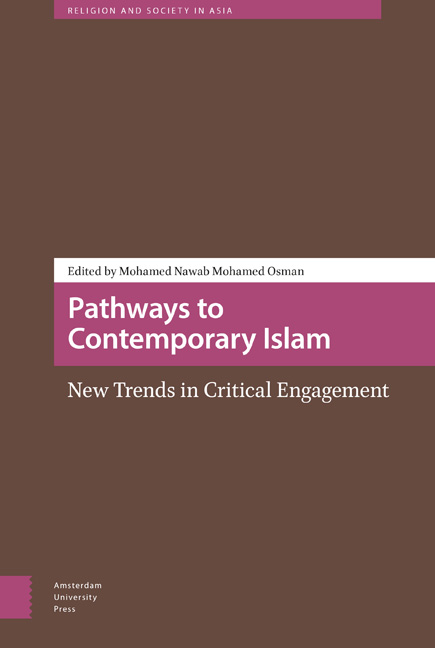Book contents
- Frontmatter
- Dedication
- Contents
- Acknowledgements
- Introduction: Constructing Pathways to Contemporary Islam
- Section 1 Historical Trends in Contemporary Perspective
- Section 2 Contesting the Islamic Intellectual Tradition
- Section 3 Beyond the Arab Revolutions: Political Islam Revised
- Section 4 Contemporary Spaces of Critical Engagement
- Notes on the Contributors
- Index
4 - The Best and Most Trying of Times: Islamic Education and the Challenge of Modernity
Published online by Cambridge University Press: 25 November 2020
- Frontmatter
- Dedication
- Contents
- Acknowledgements
- Introduction: Constructing Pathways to Contemporary Islam
- Section 1 Historical Trends in Contemporary Perspective
- Section 2 Contesting the Islamic Intellectual Tradition
- Section 3 Beyond the Arab Revolutions: Political Islam Revised
- Section 4 Contemporary Spaces of Critical Engagement
- Notes on the Contributors
- Index
Summary
Abstract
In recent years, scholars and policy analysts have grappled with the question of the relation of Islamic education to politics, public ethics, and modern social change. This chapter examines the origins, social role, and varieties of Islamic education, and their transformation in modern times. The chapter shows that, although Muslim educators in a few parts of the late-modern world have been resistant to efforts at educational reform, the great majority have responded positively and energetically. They have done so in response to both the hopes and aspirations of Muslim parents and youth, and the recognition that moral and intellectual progress in Muslim-majority societies requires a dialogue with and integration of the sciences of the world with the sciences of revelation.
Keywords: Islamic schooling; modern social change; ethical renewal; science and revelation
Since the Taliban seizure of Kabul in September 1996, scholars and policy analysts have grappled with the question of the relation of madrasa education to Islamist extremism. The fact that madrasa-based students played a role in the Taliban's rise to power seemed sufficient proof for many observers that the institution is a platform for anti-democratic and anti-intellectual indoctrination. The Jemaah Islamiyah terrorists who carried out the Indonesian Bali bombings in October 2002 were also found to have ties to madrasa-based networks of militants operating in Malaysia and Indonesia.
More recent studies have confirmed that even in state-sponsored public schools in Saudi Arabia and Pakistan, religious portions of the curriculum promote harshly intolerant viewpoints with regard to Shi’a, Sufis, Christians, Jews, and those deemed ‘unbelievers’. With their violent attacks on all institutions of modern learning, Daesh in the Middle East and Boko Haram in West Africa have confirmed once again that, for some radical extremists, modern schooling and intellectualism are antithetical to Islam.
There is and never was any single type of madrasa or Islamic schooling, and, as this chapter will attempt to explain, the Taliban, Daesh, and Boko Haram are the exception rather than the rule in most of today's Muslim world. In fact, and to introduce a theme at the centre of this study, over the course of the past century, and especially over the past thirty years, Islamic education has experienced an intellectual renewal as far-reaching as any since the early Abbasid dynasty in the eighth to ten centuries.
- Type
- Chapter
- Information
- Pathways to Contemporary IslamNew Trends in Critical Engagement, pp. 99 - 124Publisher: Amsterdam University PressPrint publication year: 2020

